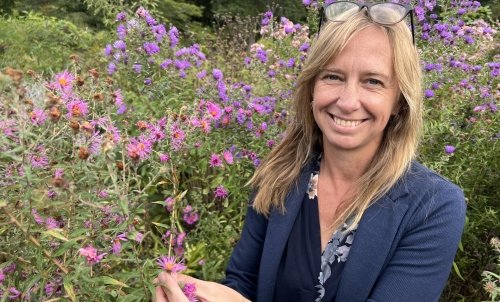Meet the FAS faculty: Erika Edwards
Inside the greenhouse in the Marsh Botanical Garden, the nepenthes plant reached out, its towering stature allowing it to soak up the rays of sunlight from above. As she walked through the rows of plants, Professor Erika Edwards paused to inspect it, its pitchers poised to catch poor unsuspecting flies and insects as victims for its next meal.

To nominate an FAS faculty member to be featured in this series, please email fas.dean@yale.edu.
Inside the greenhouse in the Marsh Botanical Garden, the nepenthes plant reached out, its towering stature allowing it to soak up the rays of sunlight from above. As she walked through the rows of plants, Professor Erika Edwards paused to inspect it, its pitchers poised to catch poor unsuspecting flies and insects as victims for its next meal.
Edwards is Professor of Ecology and Evolutionary Biology in the Yale Faculty of Arts and Sciences, the Curator of Botany at the Peabody Museum of Natural History, and the Director of Marsh Botanical Gardens.
Edwards has always had an affinity with nature, loving the outdoors as a child, but it wasn’t until she enrolled in introductory courses in plant biology during her undergraduate studies at Stanford University that she began to see plant science as a possible career.
“I had a few really good professors who taught me plant ecology and plant physiology and I just fell madly in love with plants and wanted to know anything about them,” she said.
With her drive for botany ignited, she earned her PhD in Ecology and Evolutionary Biology from Yale in 2005. Soon after, she became Assistant Professor of Biology at Brown University in 2007, working and holding several positions there for a decade before being appointed at Yale in 2017.
A self-described “plant evolutionary biologist,” Edwards’s research focuses on discovering the mechanisms that link to different types of photosynthesis arising in various species of plants. Contrary to popular belief, photosynthesis isn’t just one monolithic process but actually varies in certain plants.
She currently studies how various plants evolved into adopting specific forms of photosynthesis called C4 and CAM photosynthesis. She does this by viewing evolutionary trends through genome sequencing, analyzing gene expression in various plant tissues from RNA extraction and comparing the relationships between various plant species by developing phylogenetic trees. Also called the “tree of life,” phylogenetic trees function as diagrams that show the evolutionary links between different types of species.
“In my lab, we’re really inspired by the biodiversity that’s out there in the world and actually how little we still know about it,” she said.
C4 and CAM photosynthesis are adaptations to certain environmental conditions such as low CO2, hot temperatures, and drought. Edwards is interested in finding out why certain species use C4 and CAM photosynthesis by tracing their evolution over millions of years in existence, with the Portullugo plant lineage being her current research target. This type of plant biology research has implications for climate solutions, and it also reflects the importance of scientific discovery for its own sake. Edwards highlighted how there are undiscovered yet critical attributes of ecosystems and organisms that scientists and the public don’t know about. “Just getting out there and getting to know organisms is really very critical right now,” she said.

Edwards holding revision plans for Marsh Botanical Garden
That passion for scientific creativity is fueling the redesign of the Marsh Botanical Gardens; Edwards wants to create a biological hub capable of accommodating increased research demands, while serving as a reprieve for local plant lovers and New Haven residents.
Edwards described the project as a “a complete re-imagination of what the garden could be for Yale and the greater New Haven community.” The vision for the garden includes a new state-of-the-art plant research facility, teaching classrooms and teaching-dedicated greenhouses, a new public biodiversity conservatory, and an expansive outdoor landscape.
“We want to build the outdoor gardens for Yale, but we also want to build them for New Haven. So it can be a place for residents to come and just enjoy,” she said.
The redesign takes inspiration from Beatrix Farrand, noted early-20th century landscape architect, who originally designed the Marsh Botanical Gardens in the 1920s. Over the years, the Gardens have become more greenhouse-oriented, but Edwards hopes to revive Farrand’s legacy by highlighting the natural landscape.
The botanical garden offers space and research laboratories for Yale community members to use, most often faculty and students in the FAS departments of Molecular, Cellular, and Developmental Biology (MCDB), Ecology and Evolutionary Biology (E&EB) and in the School of the Environment.
Despite the lengthy renovation process, Edwards remains steady in her enthusiasm for the project, staring down at the papers with blueprints in her hands before longingly looking at the garden, imagining all the possibilities that lay ahead.
“I have seen plant biology just kind of blossom and grow in this really organic way across all these different departments. It wasn’t really planned, but it happened, and we have a lot of momentum right now,” she said. “I just feel very excited to have the colleagues that I have here. I think we can build something pretty special.”